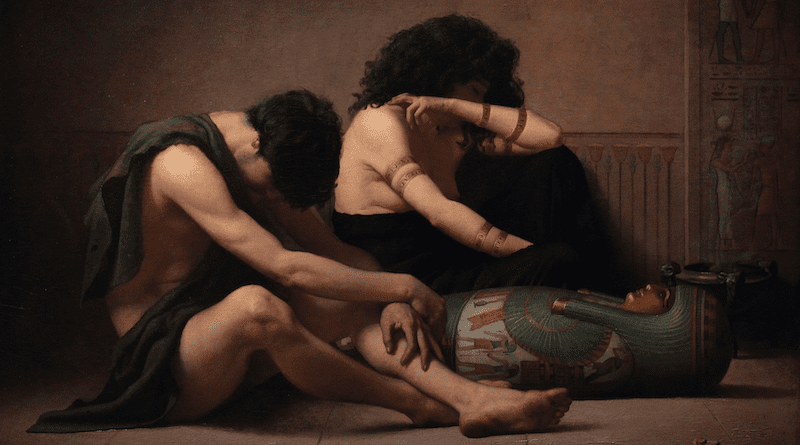Can The Ten Plagues Be Miracles? – OpEd
The ten plagues are almost as famous as the ten commandments.
Yet the ten commandments, whose influence on the history of humanity is evident to this day, (the whole world observes a seven day week with one special day of rest and prayer) are not considered miraculous; while the ten plagues (including very large amounts of frogs, hail and locusts) are considered miraculous. Why?
We usually think of miracles as redemptive events: a miraculous healing, escape from danger, or sudden turn from bad circumstances to good fortune.
But even more miraculous is the transformation that occurs when people (in this case the oppressed Jews in Egypt) are enabled to see that God is not the various deified forces of nature, but rather God is the still small voice within calling for freedom and justice.
Exodus is replete with hints that the crux of the narrative is a battle between the One God and Pharaoh, the god of Egypt.
Thus, God’s mystifying hardening of Pharaoh’s heart is necessary so that not just one but many Egyptian gods could be defeated. Each plague is a sign of an Egyptian God’s, or its sacred animal’s, impotence.
Nearly one hundred different mammals, birds, reptiles, and fish were regarded as sacred to various gods in ancient Egypt, and their bodies were mummified by thousands…. The cost of this religious procedure was enormous.
Most animal mummies have been found in vast animal cemeteries. The dog cemetery at Saqqara, for instance, contains 7 million mummies. The mass death of frogs or cattle was a disgrace to its God.
The death of Pharaoh’s first born son is not a miracle; it is a sign that during the epidemic of child deaths, the son of the great God Pharaoh cannot even be saved by his own Devine Father.
Natural forces are multiple but each one fails when confronting the one God of humanity (Israel first, humanity ultimately).
It takes ten victories spread out over a dozen or two dozen years to convince the Israelites they should leave the confines of Egypt for future freedom, and the promise of a Divine commitment. Both are scary. Some people just seek freedom to avoid responsibilities. Some forgo both.
The Exodus narrative, and the ten plagues, teaches us to grab the opportunity to go for both personal and national freedom as well as personal and national responsibility.
Since very few people today know enough about Egyptian gods to connect each plague to a specific Egyptian god the way both Egyptians and Jews did in those days I offer the following information:
Blood – Exodus 7:19-21 The Nile river was worshipped as the God Hapi, father of the Gods, so it became blood red with pollution and all life in it died.
Frogs – 8:1-2, 7-10 Heka, the Egyptian goddess of intelligence, represented by a toad/frog, was also the goddess of resurrection. Frogs and toads were sacred and one who killed a frog was put to death, so pollution drove the frogs out of the water and all over the land of Egypt lots of frogs were squished.
Insects- 8:12-13 the dung beetle Khepri was the emblem of Ra the sun God. The insects prevented the scarab beetle from rolling its little ball of dung, which represented the daily revolution of the sun.
Flies- 8:17-20 Geb, god of vegetation, refers to pollinating insects, so God replaced them with flies that cannot pollinate. Ptah, god of the land that appears after the fertilizing overflow of the Nile ends also could be intended. Some translate arov as wild beasts.
Beasts – The god Set, represented by a crocodile, had its own temples and priests, thus God sends wild beasts to attack the crocodiles.
Cattle Plague –9:2-7 8-11 One of Egypt’s chief gods was Apis, a bull. They also worshipped Osiris, a goat, and Isis/Hathor, a cow. So God kills cattle with a plague of hoof and mouth disease. Also affected were some people who lived too close to cattle.
Hail – 9:22-26 Horus, the falcon sky god, and Nut the sky goddess were defeated as God destroyed the crops with hail from the sky.
Locusts –10:12-15 The goddess Isis was a protector against locusts.
Darkness –10:21-23 Ra, the sun god, who was the divine father of each Pharaoh, was defeated by three days of total darkness
Death of Pharaoh’s son- Anubis the god of the cemeteries was responsible for inventing embalming (making possible mummification) a process that tries to deny death. Thus all the first-born were symbolically killed I.e. forced to face death when their gods failed them.
All of this results from the One God of freedom and responsibility commitment: “On ALL the gods of Egypt I will execute judgments” (Exodus 12:12)

